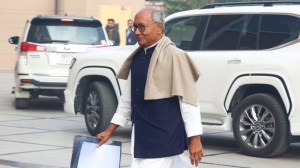Manmohan146;s chance
Our gentleman PM should thank the Karnataka government for raking up the case against Uma Bharti. Now that she has resigned, t...

Our gentleman PM should thank the Karnataka government for raking up the case against Uma Bharti. Now that she has resigned, the way for Singh to get rid of his tainted ministers is cleared. He should not lose any time in asking the tainted ministers to submit their resignations.
8212; K.R.P. Gupta On e-mail
Broker rajya
8226; We fully agree with your editorial 8216;Taken for a truck ride8217; IE, August 24. The consumer8217;s voice, which as you say is important and influential, is waning today. Misguided agitations and hired rallies on unnecessary issues have become the pattern. India is now being ruled by the broker samrajyam. We must be shamed by looking at the governments of tiny islands like Singapore that are run so efficiently and ably.
8212; K.V.L. Shanta Singapore
Just look at MPs
8226; In your editorial 8216;Everywhere a taint8217; IE, August 24, you call for the wise men and women in parliament to address the questions raised by the tainted in politics on the floor of the House. This is a joke. Who is entering the august House nowdays? Influential, rich persons with tainted backgrounds, decorative film stars and a few honest members whose voice we are no longer able to hear. There were once persons in the House who spoke on principles and who shone by their conduct. Indian democracy has become a mobocracy.
8212; K. Srimahalashmi On e-mail
Bad logic
8226; This is an excellent article 8216;Life and death held in balance8217;, IE, August 23. But just because our legal system is so pathetic that the rich do not get the death penalty doesn8217;t mean that the others who do for a good reason should be pardoned. What about the victims and their families? Don8217;t they need justice?
8212; Rohini Shenoy Mumbai
Vendetta politics
8226; The Uma Bharti episode is a grim reminder of how our politicians are indulging in vendetta politics. Since the BJP used its government in Jharkhand to revive a decades-old case to jail tribal leader Shibu Soren, the Congress has retaliated by reviving the case against Bharti. The thin line dividing legitimate politics from divisive intent is being erased fast. The judiciary, on account of its inherent delay, is becoming a tool in political warfare.
8212; J.M. Manchanda On e-mail
My freedom fighter
8226; Every political party seems to be promoting its own brand of freedom fighters while those not fitting within its frame of reference are downplayed, if not degraded. Veer Savarkar8217;s long incarceration is being belittled to drive home that 8216;8216;our freedom fighters are better than yours8217;. It would be quite improper to assign the degree of patriotism in each point of view at this point of time. There is no utility in raking up the past. It would be wrong to attribute our freedom to a single person or any one party. We must now redefine the frame for looking back at our freedom fighters. Can a comprehensive list of all freedom fighters who had made meaningful contributions be prepared by independent historians by going through authentic records?
8212; Raghubir Singh Pune
Write back
8226; Shekhar Gupta, editor-in-chief of The Indian Express, has criticised the BJP for objecting to Textile Secretary Wajahat Habibullah8217;s views on the Kashmir issue, which he has expressed in his report 8216;8216;The Kashmir Problem and Its Resolution8217;8217;, prepared under a fellowship programme of the US Institute of Peace. Gupta is entitled to his views, but the BJP cannot let his unfair remarks about our party and his indefensible defence of Habibullah8217;s views go uncontested. Indeed, there is a lot of prejudice about the BJP in Gupta8217;s article, evident in the very title he has chosen for his weekly column 8216;8216;A Bharatiya Janata Pity8217;8217;, August 14, 2004, and also in his unsavoury remarks about our party president M. Venkaiah Naidu.
Gupta claims that there is nothing objectionable in Habibullah8217;s report, nor in his observations and prescriptions about the American role in resolving the Kashmir issue. These do 8216;8216;not vary one bit8217;8217; from the official Indian line, the editor claims. He even imputes motives to the BJP for having criticised Habibullah 8212; that we made him 8216;8216;a natural target8217;8217; only because 8216;8216;he happens to be a Muslim8217;8217;.
The BJP would like the readers of The Indian Express to judge for themselves if a serving senior officer of the Government of India is entitled to make the following remarks, which we believe are unacceptable from a national perspective, about a sensitive issue that has troubled India since Independence.
8226; 8216;8216;While there was no doubt that policymakers, both in India and Pakistan, have a vital role to play in any political solution to the problem, he Habibullah felt that it was the people of the valley who should have the final say in what they wanted in terms of resolution.8217;8217; As reported on the website of the US Institute of Peace.
8226; 8216;8216;The political upheaval of recent years has exacted a heavy toll on the state8217;s economy, and the richest source of income has become the threat and use of violence. Mired in poverty, young people are easily recruited into predatory terrorist and paramilitary organisations, some of which are financed and trained by Pakistan8217;s security services, some of which enjoy the protection of Indian authorities.8217;8217;
8226; 8216;8216;8230;the Kashmiris found themselves essentially alienated from the Indian state.8217;8217;
8226; 8216;8216;Given the deep mistrust that Kashmiris have of India and their growing mistrust of Pakistan, the United States might find it advantageous to cultivate its positive image especially now that that image is beginning to fray because of events in Iraq.8217;8217;
Habibullah states that 8216;8216;Most Kashmiris regard the United States as an honest broker. In fact, Kashmiris credit all positive developments in the region over the past five years to efforts made by the United States8230; A popular perception among Kashmiris is that the sporadic periods of near normalcy achieved in Jammu and Kashmir have been the result of US efforts.8217;8217; This gives an impression that all the positive initiatives of the Vajpayee government in the past six years 8212; free and fair elections in J-K, peace process with Pakistan, talks with Hurriyat etc. 8212; happened at the behest of an external power. This is not only untrue, but even to suggest so is to show one8217;s own country in a poor light.
Habibullah states that 8216;8216;The United States could play a crucial role as a facilitator 8212; not as a mediator 8212; paving the way towards resolution while leaving the principal stakeholders to determine the form of that resolution.8217;8217; But what he actually means by facilitation is amply clear from his appreciative reference to an article published in Foreign Policy in spring 2000 by Strobe Talbott, deputy secretary of state under President Clinton. According to Talbott, the concept of nationhood is metamorphosing in a world of globalisation. Quoting him, Habibullah writes, 8216;8216;National sovereignty and national identity are still very much part of the international landscape. But the environment in which they exist is increasingly subject to forces that for good or ill cross borders 8212; forces that constitute what sovereign states have classically considered interference in their internal affairs8230;Talbott asked that disputing parties recognise this new context in which they are operating when attempting to resolve the issues between themselves.8217;8217; Emphasis ours.
For the past several decades, India has been resisting attempts by Western countries to interfere in our internal affairs by trying to play a role in the Kashmir issue. Had India not resisted these attempts, Pakistan would have long ago succeeded in its strategy of internationalising the issue. Now, a serving bureaucrat of India is publicly calling for the US to play the role of a 8216;8216;facilitator8217;8217;. And Gupta claims that, in doing so, Habibullah is 8216;8216;merely restating an old sarkari position8217;8217;. Which Indian government has taken this position?
Indeed, Habibullah argues in favour of Washington8217;s role in just about every aspect of Jammu 038; Kashmir affairs 8212; 8216;8216;helping to restore a highly functioning, robust democracy in Kashmir8217;8217;, 8216;8216;Supply of US expertise and resources to help Kashmiris suffering from post-traumatic stress disorder8217;8217;, 8216;8216;securing foreign investment for the economic revitalisation of Jammu and Kashmir8217;8217;, 8216;8216;creating employment opportunities for the youth of Kashmir8217;8217;, and 8216;8216;boosting the chances8217;8217; of Indian government8217;s dialogue with the Hurriyat Conference. He even favours 8216;8216;US helping Pakistan modernise its armed forces8217;8217; as an 8216;8216;incentive8217;8217; to 8216;8216;encourage India and Pakistan to settle their differences peacefully8217;8217;.
Habibullah as a private citizen is entitled to expressing his views publicly. But as a serving officer of the Government of India, he cannot air his views on a sensitive national issue, especially when many of these views are at marked variance with the position of the Indian government. We stand by our earlier demand that the Government take disciplinary action against Shri Habibullah.
8212; Shivraj Singh Chauhan BJP general secretary and MP
- 01
- 02
- 03
- 04
- 05































